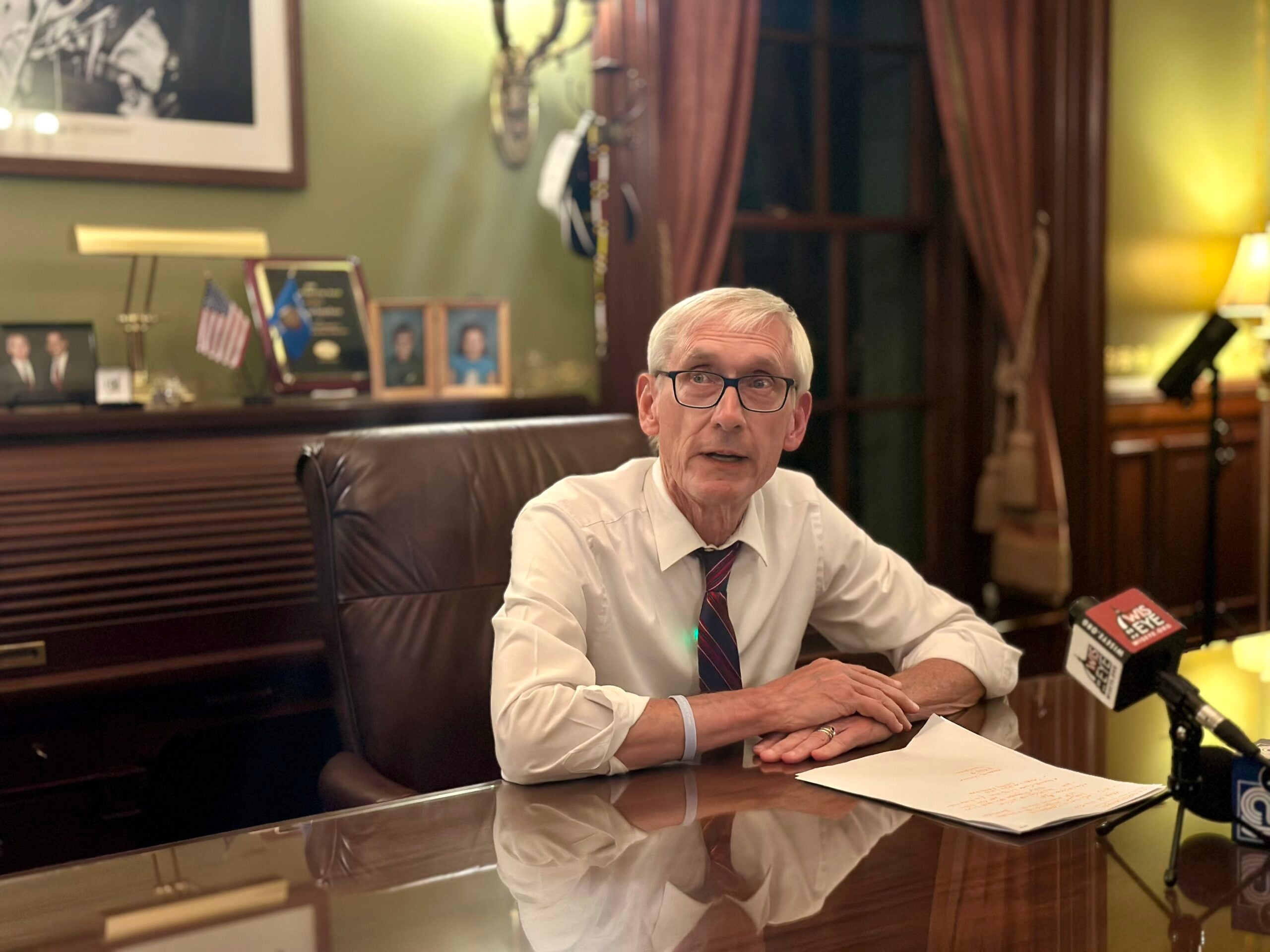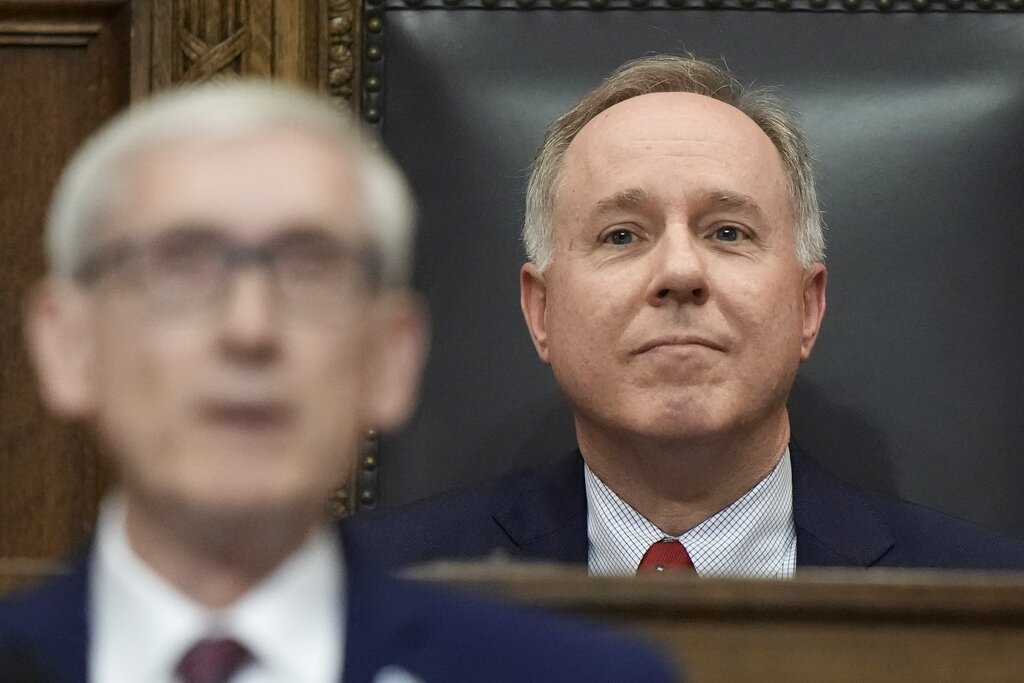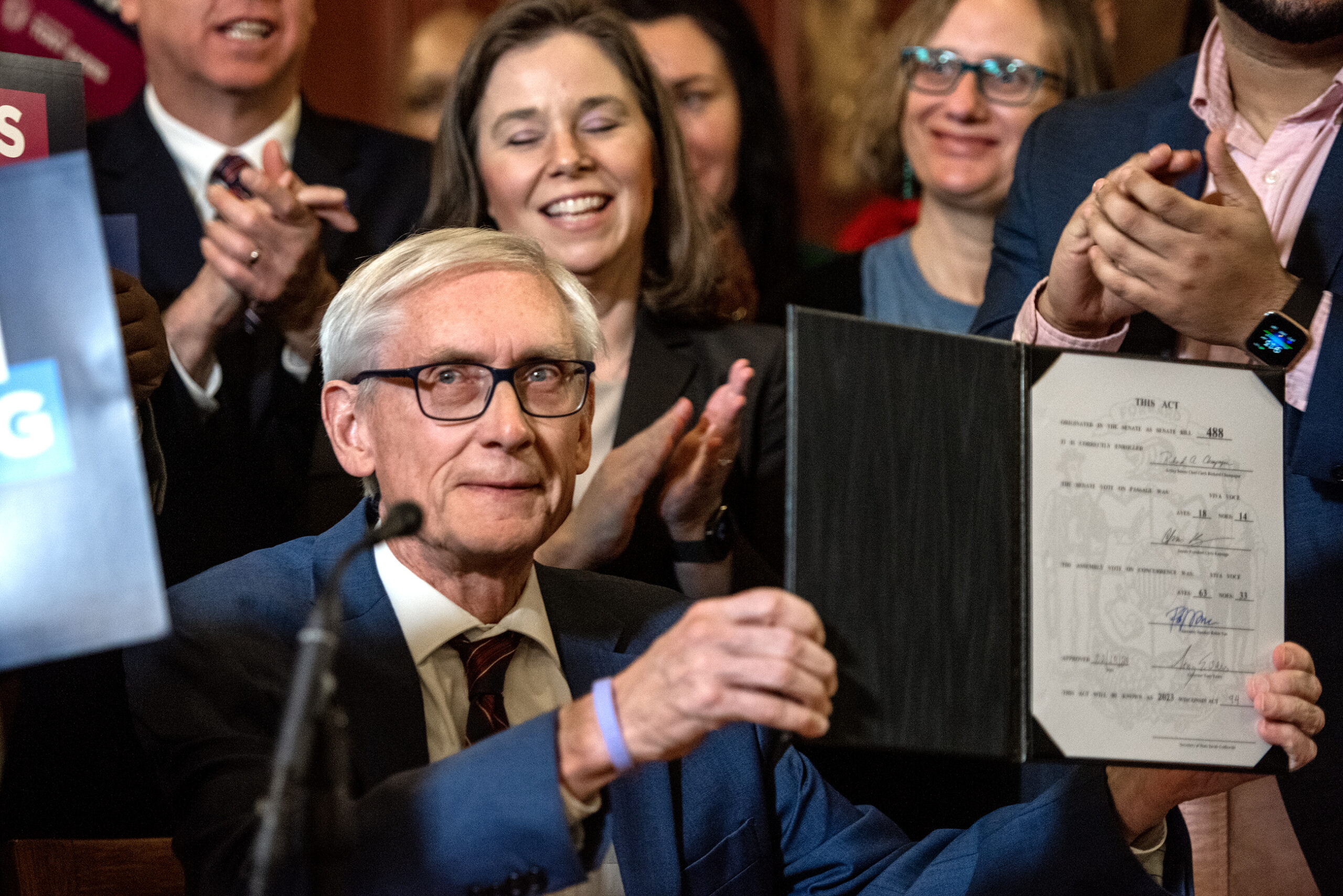Wisconsin lawmakers voted to approve a state budget late Wednesday night that spends more than $111 billion over the next two years, cuts more than 300 state positions and increases funding for the child care industry and the Universities of Wisconsin system. It also cuts taxes by about $1.4 billion.
Lawmakers debated through the day in an effort to get the budget to Gov. Tony Evers’ desk by nightfall. They were racing ahead of a federal deadline that could have caused Wisconsin to lose out on more than $1 billion in health care funding.
They succeeded. Evers signed the bill at about 1:30 a.m., wielding his powerful partial veto pen on several dozen items but maintaining the core of a bipartisan deal announced earlier this week.
News with a little more humanity
WPR’s “Wisconsin Today” newsletter keeps you connected to the state you love without feeling overwhelmed. No paywall. No agenda. No corporate filter.
The speedy process stood in contrast to the monthslong, halting negotiations that saw Republicans fighting within their caucus, and ultimately striking a deal with Senate Democrats and Evers.
Republicans have a majority in both the state Assembly and the Senate. But several Republicans voted against the document drafted by their colleagues on the Joint Finance Committee, arguing it spent too much. That meant Democratic support for the budget bill was necessary for it to pass.
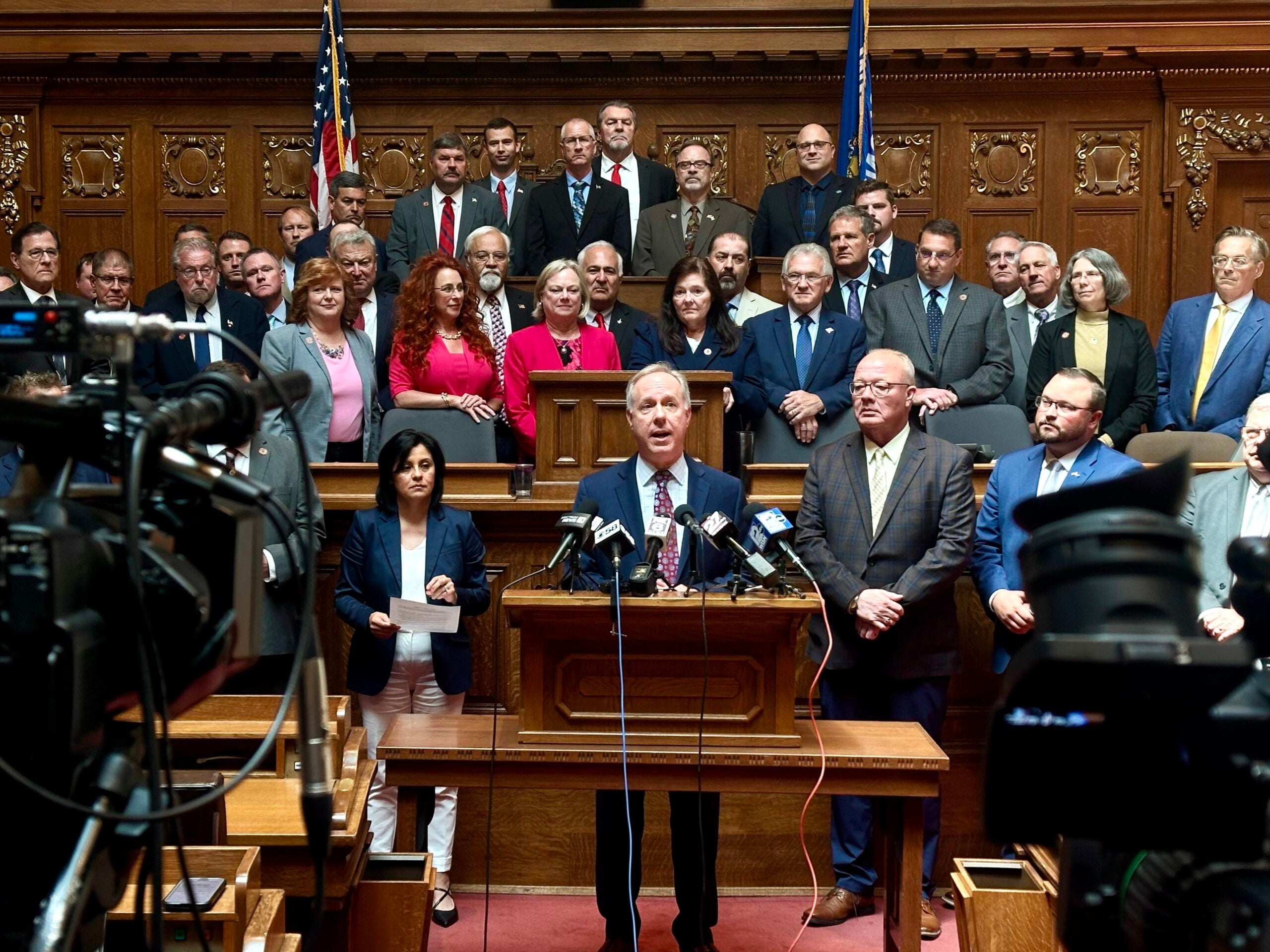
After hours of debate throughout Wednesday, five Democrats in the Senate voted alongside 14 Republicans to pass the bill. Four Republicans voted against the bill.
In the Assembly, the budget passed 59-39 after midnight, with seven Democrats voting yes, and one Republican, Rep. Scott Allen of Waukesha, voting no.
At a late-night ceremony in his office after the bill passed both houses, Evers praised the bipartisan work that led to the bill’s signing.
“The work that our staff did and other people on the other side, it’s hard work, and we accomplished lots of things,” the governor said. “We didn’t accomplish everything we want, but, you know what? That’s the way it works.”
Throughout Wednesday, Republican leaders echoed that appreciation for the bipartisan process.
“This isn’t a budget that, if we (Republicans) had all three branches, that we would have adopted, right? But it is a reasonable, good compromise budget,” said Assembly Speaker Robin Vos, R-Rochester.
Vetoes on Green Bay prison closing date, conservation projects
Evers exercised a partial veto on some two dozen items, including striking the year 2029 from an effort to close Green Bay Correctional Institution. While Evers himself has called for the notorious prison to be decommissioned by 2029, he argued the GOP-authored budget doesn’t include a real plan to get there.
“We’re going to close it, but we need more compromise on that,” he said. “It’s more of a message that the Legislature needs to work together with us to get a plan.”
He also vetoed some reductions in funding for programs that face federal funding cuts. That will keep those programs at established funding levels.
Evers also cut several earmarked projects through the Department of Natural Resources, arguing those are specialty projects that would be better served through money for the Knowles-Nelson conservation project — funding for which was not included in the final budget.
“Instead of renewing the program and helping the many, the Legislature has opted to benefit the politically connected few,” Evers wrote in veto messages about those projects, which included river dredging in Vilas County and a retaining wall in Wisconsin Rapids.

An all-day, and late night, debate
The bipartisan deal included what Evers described as the largest increase to the state’s special education reimbursement rate in history and the largest funding increase to the Universities of Wisconsin in two decades.
The bill also cuts taxes by restructuring the second tax bracket, eliminating the sales tax on household utility bills and exempting some retirement income tax for seniors.
Republicans celebrated an overall reduction in state jobs by 303 positions, according to an analysis by the nonpartisan Legislative Fiscal Bureau. In his initial proposal, Evers’ budget would have added about 881 jobs to the state rolls.
The plurality of those cut positions come from not filling vacant positions at the Department of Veterans Affairs, according to the bureau. Dozens of roles were also cut at the Department of Administration, Department of Natural Resources and Department of Transportation. Some of those corresponded with the end of projects, but a handful took aim at specific positions, including from the Office of Clean Energy and Sustainability and the Office of Environmental Justice.
The overall reduction in positions was partly offset by new jobs created elsewhere, most significantly at the Department of Corrections and the hiring of new prosecutors.
For their part, many Democrats took credit — and praised Evers — for the bill’s final form, even as most did not ultimately vote for it, saying Evers had made it better than it would have otherwise been.
And many criticized the budget for not going far enough on their priorities. The bulk of the day’s debate in both chambers involved Democrats introducing amendments to increase funds for child care, education, paid family leave and free school lunches.
“This is a survive budget, not a thrive budget,” said Sen. Mark Spreitzer, D-Beloit, on Wednesday evening. “This is a budget that, if we are lucky, will allow our child care providers, our public schools, our universities, to survive for two more years.”
Spreitzer said the Democratic votes the bill received should not be understood as an endorsement. Rather, they are “an acknowledgement that this budget is better than no budget,” he said.
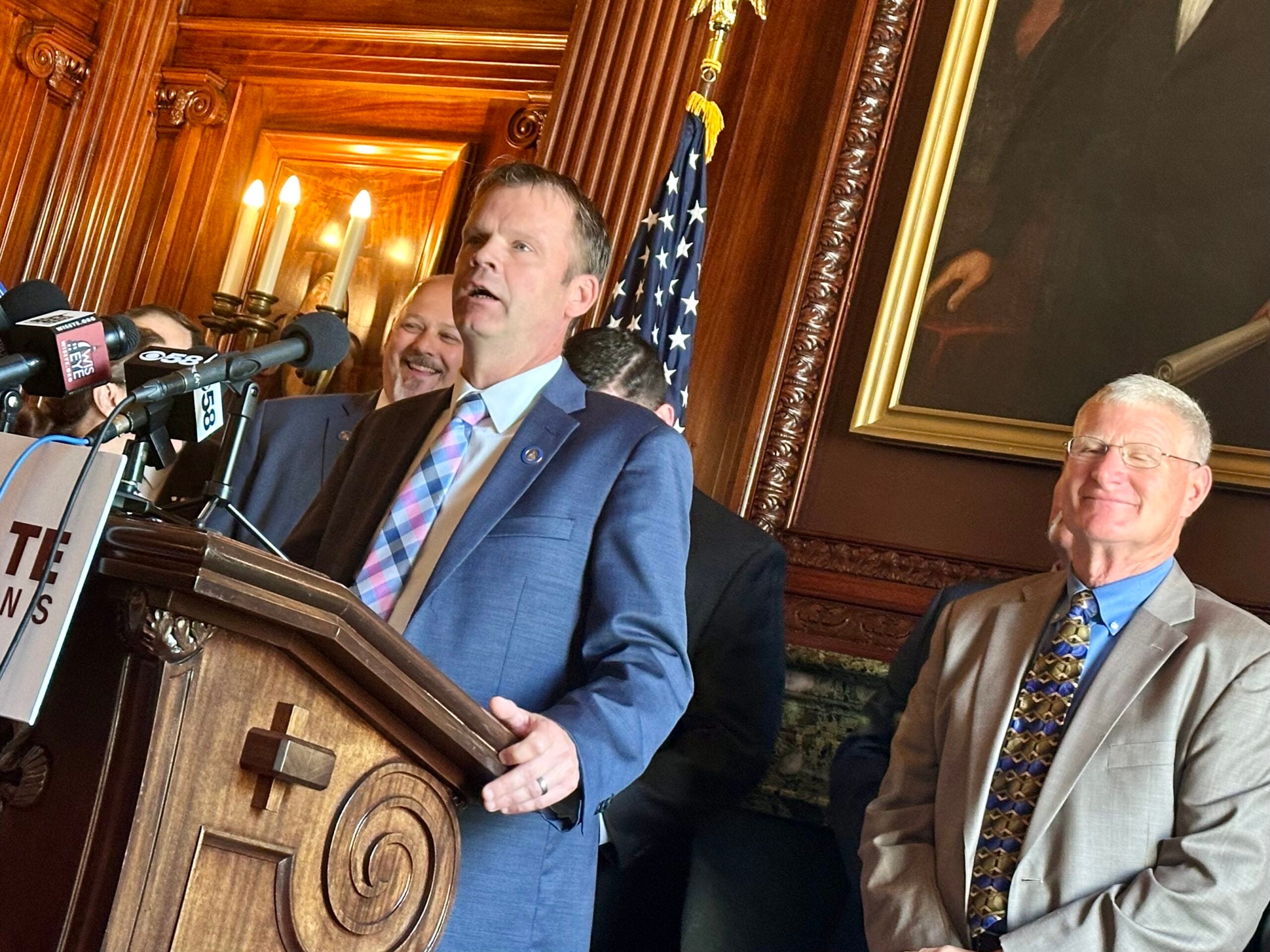
Sen. Chris Kapenga, R-Delafield, was among the staunchest Republican holdouts throughout the process, criticizing his colleagues for the size of their own proposed spending. Early Wednesday, he also criticized the speed of the process, saying it was unreasonable for lawmakers to make sense of a 421-page document in just hours.
Leaders early Wednesday said they were finalizing their own understanding of the bill, and drafting technical amendments, even as debate had begun.
That speed was motivated by a deadline out of Washington, as Congress works to pass President Donald Trump’s signature “Big Beautiful” budget bill before a self-imposed July 4 deadline. That far-reaching tax and immigration legislation includes massive cuts to Medicaid, including a cap on how much money states can request from the federal government through hospital assessment fees.
The Wisconsin state budget passed Wednesday night raises its assessment fee to the maximum amount. By passing the budget before the Trump bill is signed into law, Wisconsin lawmakers dodged the new cap.
Earlier in the day, Assembly Speaker Vos said legislative Republicans and Evers’ office were aligned in trying to pass the budget quickly for that reason.
“We all understand that once the signature goes on at the federal level, it really limits the options for us to capture that federal revenue,” he said. “I think that’s one area we found pretty widespread agreement.”
As he signed the bill into law early Thursday morning — a contrast to past budget cycles, when he has acted days after passage, during the day and often flanked by kids — Evers referred to the truncated timeline, too.
“We want our health care system to be in good shape, and in order to do that, we’re going to need help from the federal government, and whatever we can do before they pass through … the federal budget, we will be able to access help from them to keep our hospitals afloat,” he said. “It’s absolutely critical for us to do that.”
He said he wasn’t surprised to have little support from lawmakers in his own party, but argued compromise is a sign of strength.
“I’m not surprised, but a whole bunch of Republicans have supported it, so God bless them all,” he said.
Editor’s note: This story has been updated to correct the number of Democrats who voted for the bill in the Assembly.
Wisconsin Public Radio, © Copyright 2026, Board of Regents of the University of Wisconsin System and Wisconsin Educational Communications Board.

